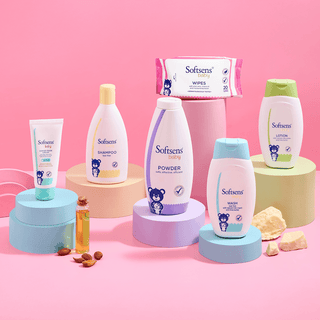
Introducing your baby to solid foods once they are ready can be a whole lot of fun. However, whether your baby is quite adventurous when it comes to trying new foods or he/she is a picky eater, it’s important to remember that there are certain foods that you should avoid serving your little one until he/she is of a certain age. Here’s our list of some of the best and worst foods for your baby. For a complete guide on how to introduce your baby to solid foods, click here.
1. Offer: Fresh fruit purees
Avoid: Packaged Fruit Juices or Soda
Fruit juices and sodas are full of sugar and have no real nutritional value. Furthermore, they can damage your baby’s growing teeth. Instead of a fruit juice, offer your baby fresh fruit purees made from apples, bananas, peaches, blueberries, plums, pears or mangoes. Avoid offering any fruity drinks right before bedtime as this can contribute to tooth decay.

2. Offer: Iron-fortified baby cereal
Avoid: Honey
When baby is ready to eat solids, most parents start off by offering easy-to-digest iron fortified single grain baby cereal. Try oats or barley instead of the usual rice cereal. Quinoa is also quite a healthy option for your little one.
Although honey is healthy and delicious, infants should not be given honey until the age of one. This is because honey may contain a strain of bacteria that can cause a rare condition known as ‘infant botulism’. Skip the honey until your little one is older.

3. Offer: Apple sauce or Date Puree
Avoid: Sugary treats and candy
Chocolates, candy and other sugary treats are high on *you guessed it* SUGAR and calories very low on nutrition. They also cause tooth damage and should be avoided as far as possible. Instead, offer naturally sweet, good baby foods such as apple sauce or a date puree. Dates are rich in fiber, iron and important vitamins & minerals. Date syrup can also be used as a natural sweetener when making different foods.

4. Offer: Mashed beets, carrots or avocados
Avoid: Salted Crackers and Popcorn
Crackers and popcorn may seem like an easy snack to give your hungry little baby but they should be avoided. Crackers are a non-nutritious snack and are high on salt. (Babies require a very small amount of salt in their diet and you can hold off on adding it to your baby’s food either until they are a year old. However, a slight bit of herbs and spices can be added to food to add flavour) Foods like popcorn can actually be a choking hazard for your little one who is still learning how to chew properly. Instead, offer a healthy snack option such as mashed beetroot, carrots or avocados, all of which are good vegetables for babies and are packed with essential nutrients.

5. Offer: Mashed sweet potatoes or Oven-baked sweet potato fries
Avoid: French fries
Babies have very tiny stomachs and hence, don’t typically eat a lot of food. That’s why it’s important to fill their tiny tummies with food that is rich in nutrients rather than with junk food that is filled with unhealthy calories. Instead of French fries, try giving your little one oven-baked sweet potato fries that are not just easy to make, but also highly nutritious. Cut them into smaller pieces so that they are easy to chew, or if your baby is still not able to chew properly, a sweet potato puree is a perfect meal!

6. Offer: Pureed meats and lentils
Avoid: Big pieces of meat
Your baby also needs their fair share of protein which can be provided by lean meats and lentils. Stay away from cured meats which are high on sodium. Meats that are thoroughly cooked and pureed are easier for your baby to eat and digest. While your baby is still learning how to chew properly, avoid offering anything that might pose as a choking hazard – this might be anything from big pieces of meat, cheese, big pieces of vegetables, grapes, nuts and seeds.

7. Offer: Yoghurt
Avoid: Cow’s milk
Plain whole milk yoghurt (without any added flavour) is rich in proteins, vitamins, minerals and healthy fats, making it quite nutritious for your little one. It is quite a delicious snack, especially when mixed with small chunks of fruit or pureed fruit.
Cow’s milk, on the other hand, is not great for babies as it is harder to digest and can thus cause tummy issues. Breastmilk or formula are better sources of milk for your baby at this stage. After your baby turns one, you can offer cow’s milk but in limited quantities.




















